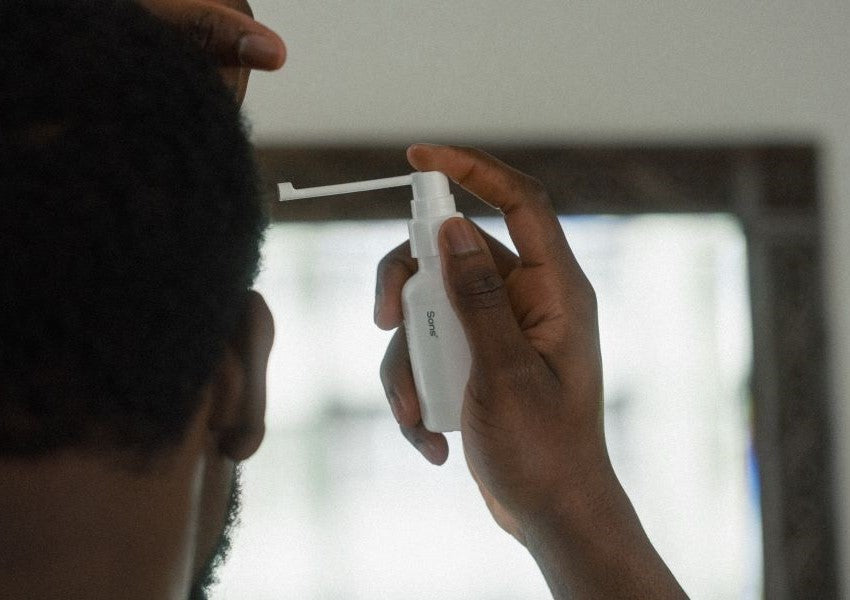Hair loss is a common concern for both men and women and can result from factors like stress, diet, illness, or conditions such as androgenetic alopecia (male or female pattern baldness). While Minoxidil has been used as a clinically proven treatment for hair loss for decades, rosemary oil is a natural alternative gaining interest. But does this herbal remedy live up to the hype, or is it better left for seasoning Sunday roasts?
Does rosemary oil work for hair loss?
Rosemary oil has been gaining a reputation recently, with some swearing by it as the key to fending off a receding hairline or patchy crown. But how effective is it really?
Just like Minoxidil, some research shows applying rosemary oil might increase blood circulation to the scalp. A study in 2015 compared the effects of 2% Minoxidil solution and topical rosemary oil on men with male pattern hair loss. After 6 months, both groups saw a significant increase in hair count, which made researchers think rosemary oil might be as effective as Minoxidil. But the study didn’t use a control group (aka a group of people who used no treatment at all) so it remains unclear whether the results were solely due to the treatments or natural hair changes.
A 2012 study tested rosemary leaf extract on mice treated with testosterone to mimic androgenetic alopecia. The results suggested that rosemary may inhibit the enzyme 5-alpha reductase, which converts testosterone into dihydrotestosterone (DHT). DHT is known to shrink hair follicles and shorten the growth phase of hair, leading to hair loss. This was an interesting find because Finasteride, prescription hair loss medication, also works by stopping this conversion from taking place. Finasteride is proven to reduce DHT levels and its harmful effects, but the research on rosemary oil’s ability to lower DHT is hazy at best.
Rosemary oil’s anti-fungal and anti-inflammatory properties may help alleviate dandruff and scalp itchiness, contributing to a healthier environment for hair growth.
Some people find using rosemary oil useful, but the trials so far have been flawed and do not prove that rosemary oil works well at regrowing hair or stopping hair loss. If you are looking for a treatment for your hair loss which is backed by science and clinical trials, you can check out our Ultimate Plan, which includes both licensed medications and supplements with natural ingredients to help with your hair loss.
How does Minoxidil Spray work?
Minoxidil’s mechanism for promoting hair growth isn’t fully understood, even the discovery of its use for treating hair loss was an accident, but its efficacy is well-documented. Originally developed as a tablet to treat high blood pressure, it was discovered to have an unexpected side effect, hair growth, leading to its reformulation as a topical treatment for hair loss.
The hair loss treatment is a vasodilator, meaning it works by widening the blood vessels, delivering a healthy flow of oxygen and nutrient-rich blood flow to hair follicles. A good blood supply to the scalp revitalises shrunken follicles by creating a nurturing environment for growth.
Minoxidil is also thought to prolong the anagen (growth) phase of the hair cycle and shorten telogen (resting) phase, leading to healthier and thicker hair over time. Clinically, 5% Minoxidil has been proven effective in stopping hair loss and encouraging regrowth, making it one of only two licensed treatments for male pattern hair loss (the other being Finasteride). And guess who is the only license holder in the UK and Ireland for these two treatments? That’s right, Sons.
Are there any other essential oils or natural remedies linked to hair growth?
Beyond rosemary, some studies on the use of oils like peppermint, pumpkin seed, and lavender for the treatment of hair loss show some potential effectiveness in mice, but to date no studies have been conducted on humans.
Another natural remedy is saw palmetto, an extract from palm tree berries. It is believed to reduce DHT levels by inhibiting the action of enzyme 5-alpha reductase. Our Shampoo and Conditioner, as well as our Hair Growth Complex, contain this natural extract, which make great supplements to medically proven treatments like Finasteride and Minoxidil.
Things to keep in mind when using rosemary oil
As of right now, the combined use of rosemary oil and Minoxidil hasn’t been properly investigated by researchers. While there's no evidence suggesting the combination is harmful, there’s also no proof that it enhances results. If you choose to experiment, you should proceed cautiously and monitor your scalp's response.
Make sure to dilute the rosemary oil properly, as if not diluted correctly, it can cause irritation or inflammation, or even an allergic reaction in some people. You should test it out on a small patch of skin before using.
So, which is better?
Minoxidil has the weight of clinical research to back it up, while the evidence for rosemary oil is limited. More long-term, controlled studies are needed before we call the jury in on this one.
In the meantime, you can take a look at our Minoxidil Spray which is clinically proven to be effective in stopping hair loss in 84% of men. When used with Finasteride, the results are even better, with 94% of men seeing a halt in hair loss after a year of consistent treatment.
By Erin Flanagan Heviken - Sons aftercare team
Reference list
Promotion of hair growth by Rosmarinus officinalis leaf extract - PubMed
Minoxidil and its use in hair disorders: a review - PMC
An Overview of Commonly Used Natural Alternatives for the Treatment of | CCID
All of our blog articles are reviewed by our Medical Director before publication.







